The Transport and City Planning MSc provides a groundbreaking and critical perspective on transport planning, with an urban and international focus.
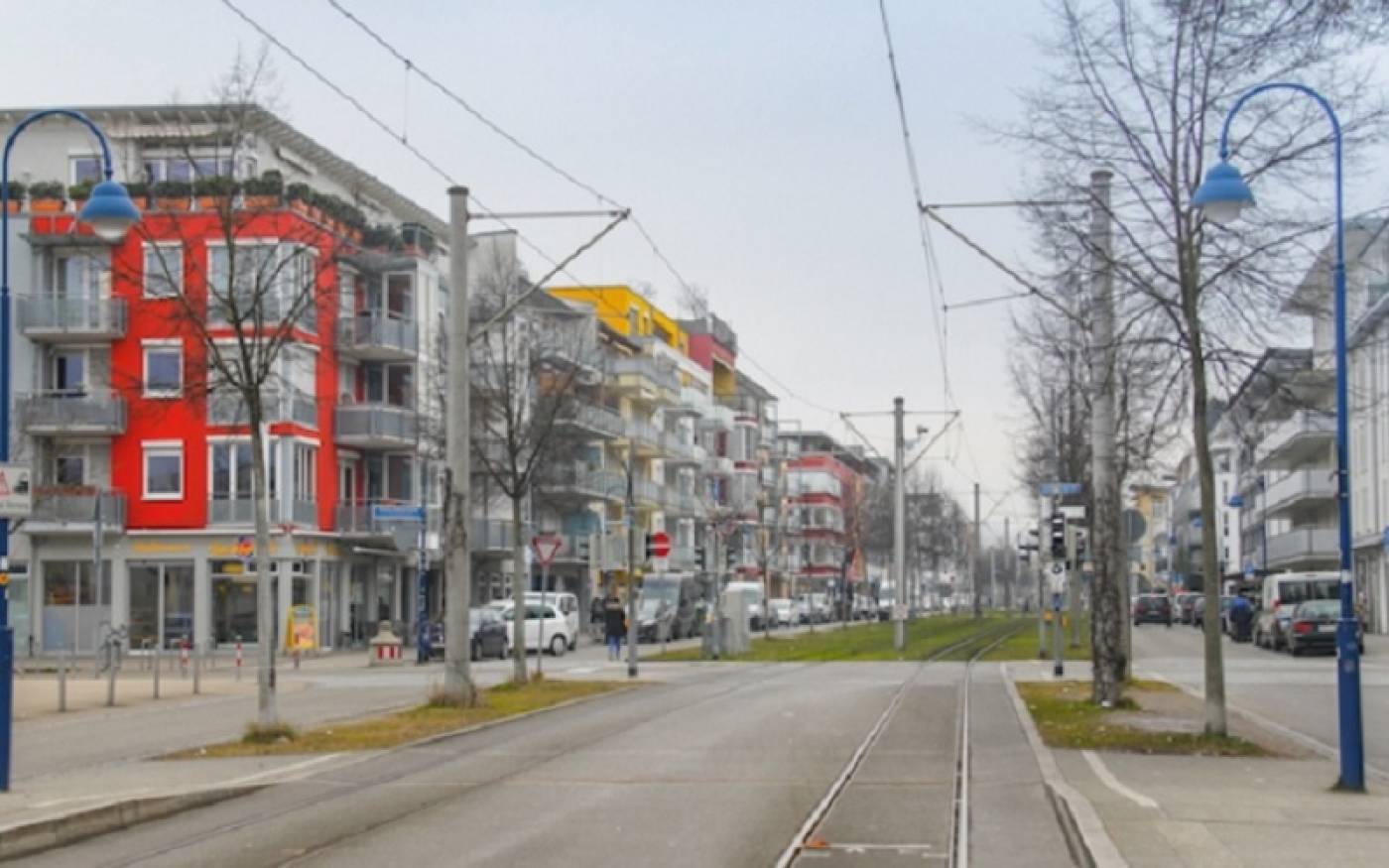
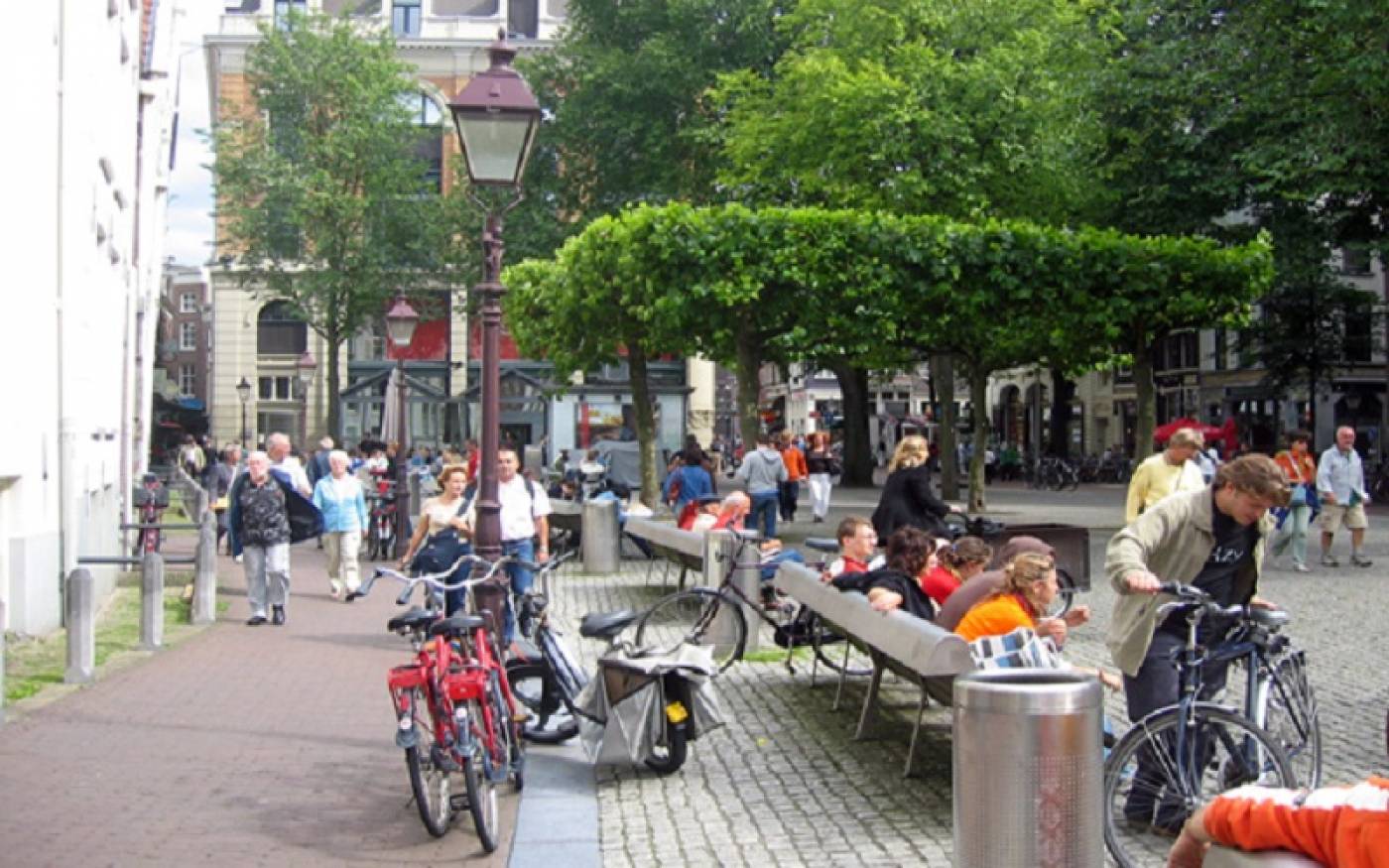
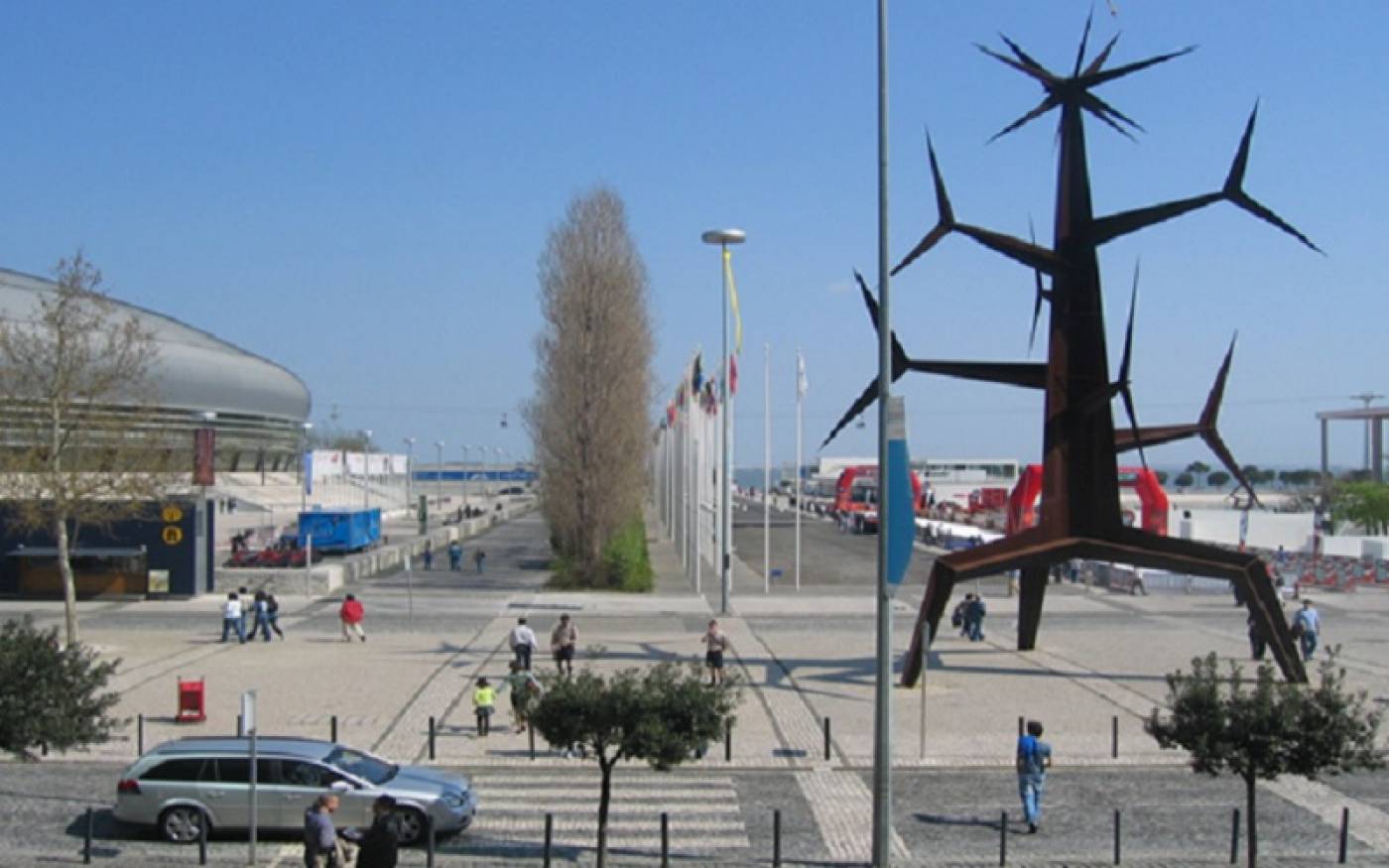
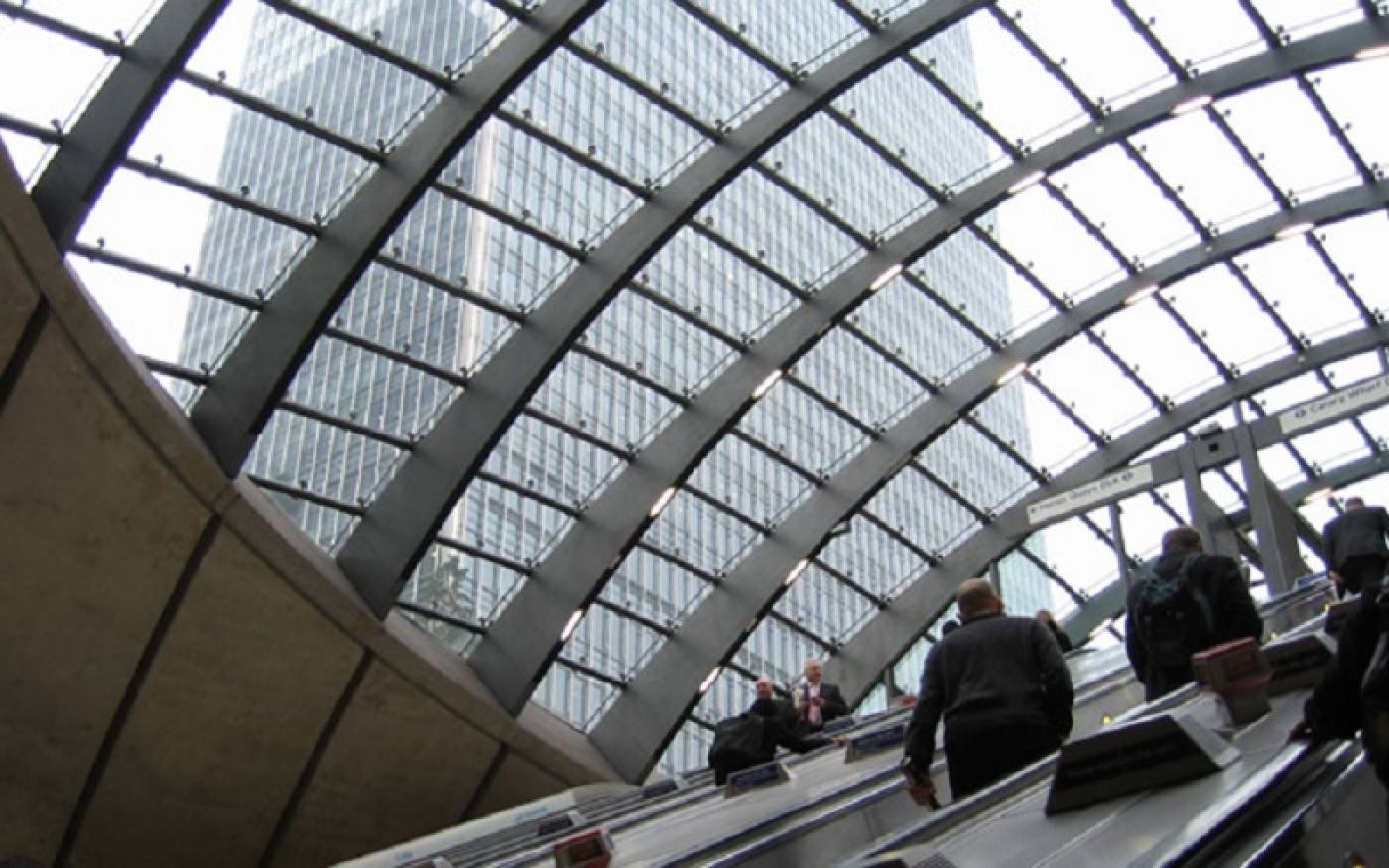
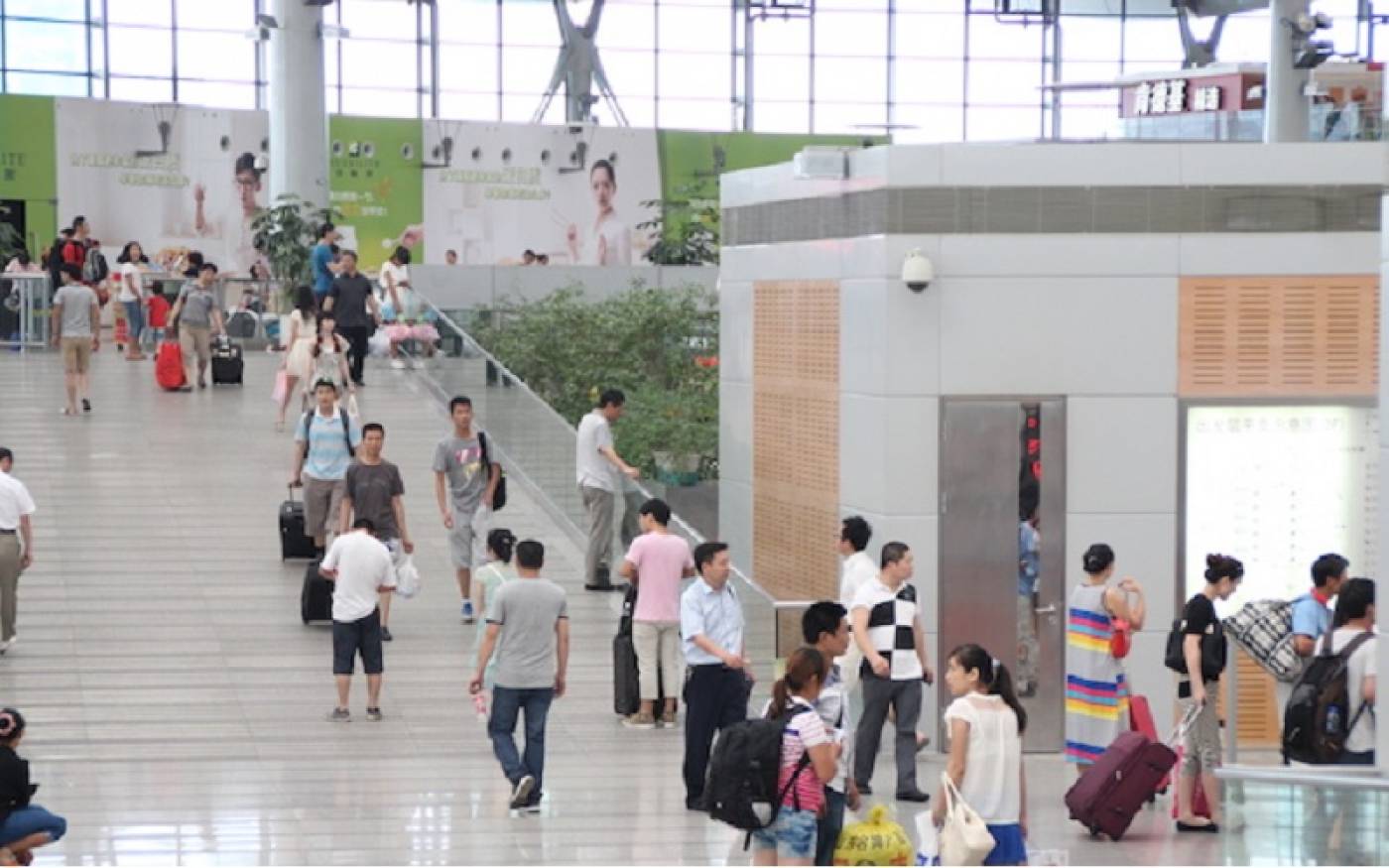
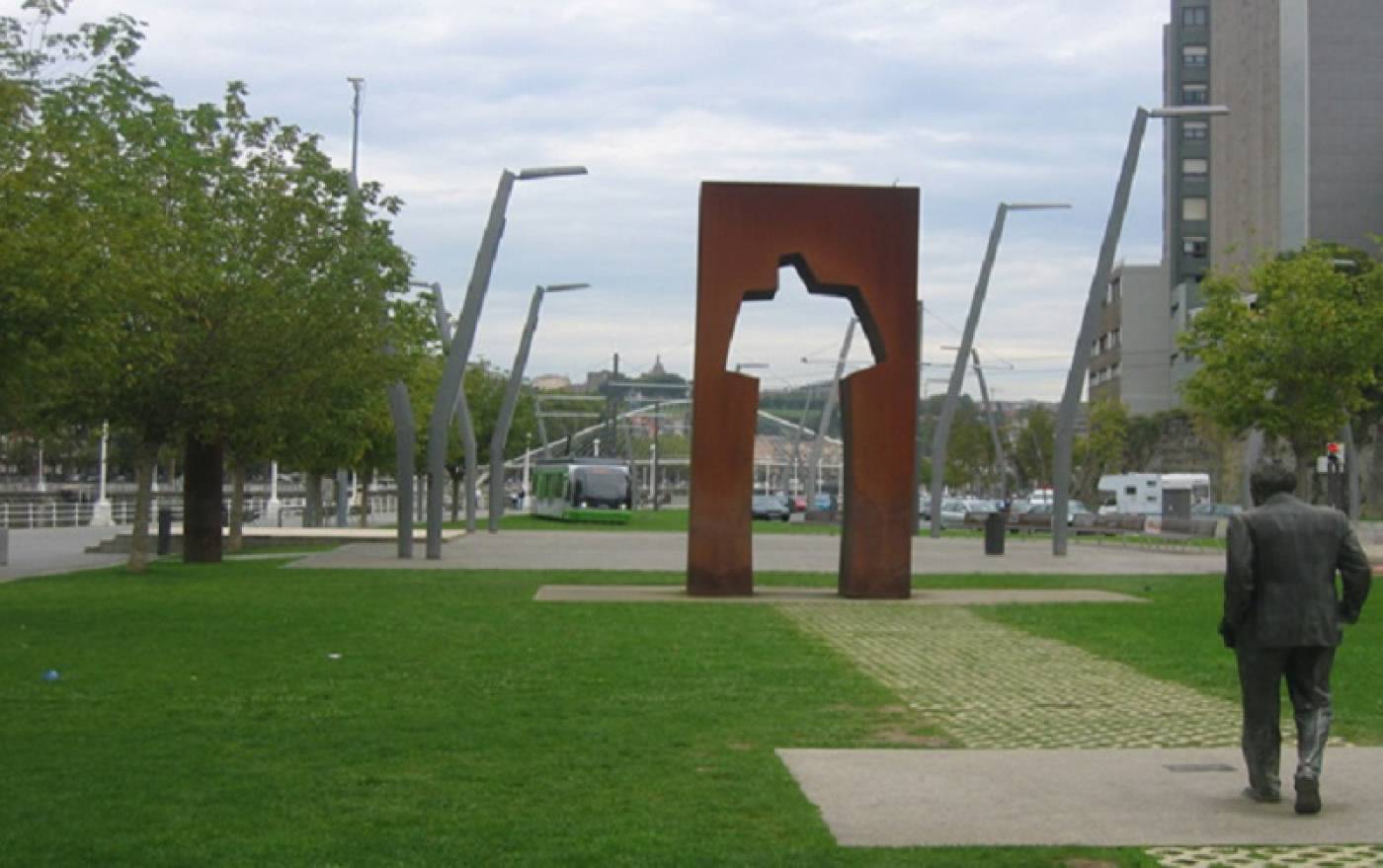
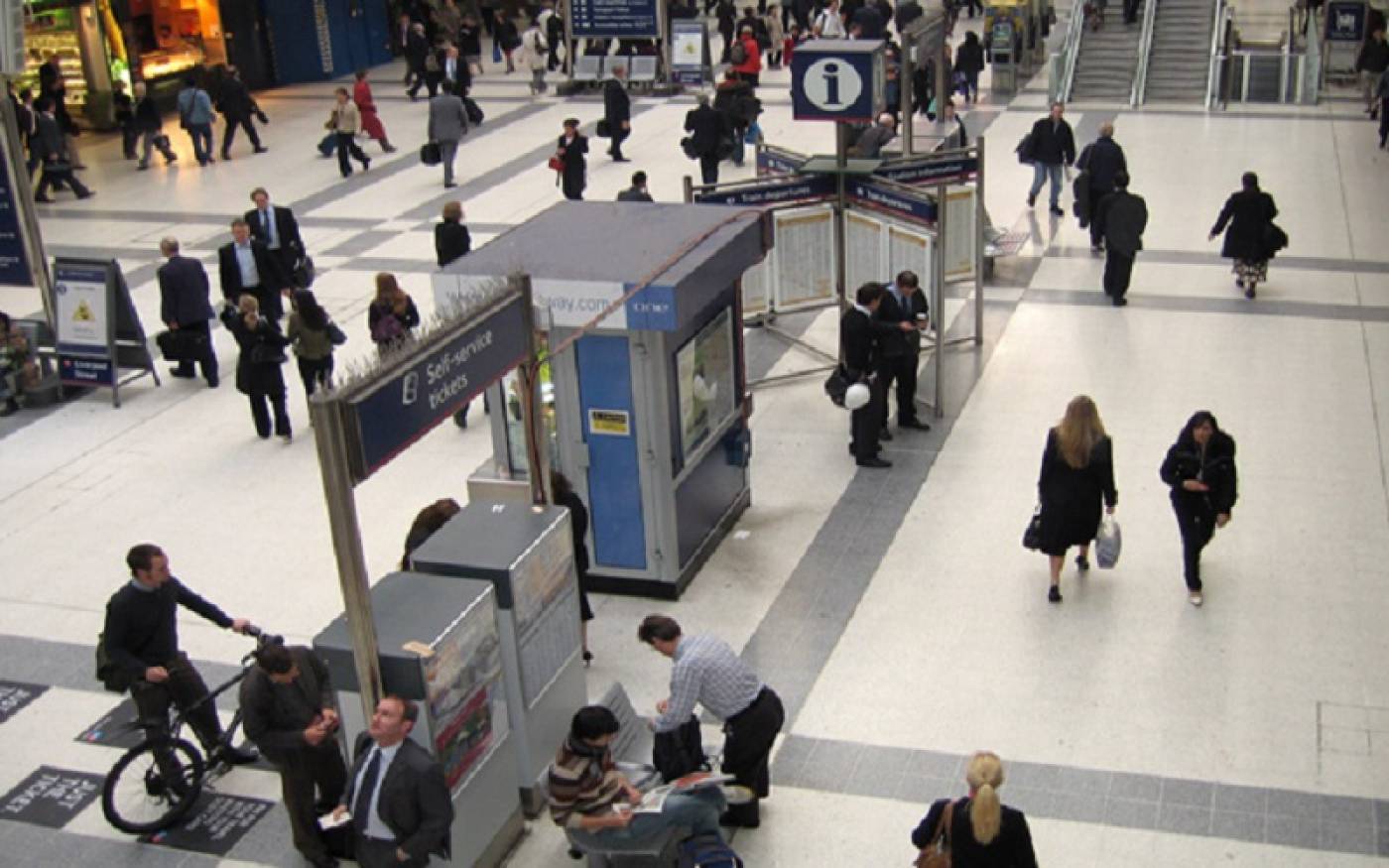
About the course
Transport supports the development of sustainable cities. Therefore, the aim of the Transport and City Planning MSc is to equip students to work effectively as transport and planning practitioners in urban contexts.
Our course has an integrative design, providing perspectives from core disciplines in urban transport planning and sustainable cities, without being rooted in either one. Through anchoring your studies in urban transport planning, we will examine the role and nature of transport planning in the delivery of sustainable cities internationally. We will cover everything from the context and rationale for transport, to infrastructure and the psychological and sociological dimensions to mobilities. Through anchoring your studies in sustainable cities, we will introduce you to some of the key sustainability debates and literature. We will consider the tensions and synergies between environmental, social and economic objectives and the theory underpinning city planning.
Why choose to study transport and city planning at The Bartlett?
We offer:
- A course that draws on UCL's position as a leading research-led university.
- Opportunities for you to acquire a broad range of skills and knowledge, while also working towards a specialisation.
- A principle- and theory-driven course that provides both conceptual understanding of theories and the practical skills needed to tackle real world problems.
Who should apply?
We welcome applications from candidates who wish to work across disciplines at strategic levels, and also those who wish to specialise in the particular following areas:
- Transport planning or engineering graduates or specialists interested in the design of sustainable cities.
- Planning or geography graduates wishing to specialise in transport planning, and want to acquire a broad knowledge of transport, planning and the delivery of the sustainable city.
- Graduates wishing to enter the transport planning or urban planning professions
Course structure
Studying on The Transport and City Planning MSc requires you to take and pass 180 credits to complete your degree, including core modules, two optional modules, and a group project. You will also be required to complete a 10,000-word dissertation on a topic of their choice to conclude the course. You will have a choice of supervisors which extends across The Bartlett Faculty of the Built Environment, most likely from The Bartlett School of Planning.
The following diagram illustrates the structure of the course when completing the Transport and City Planning MSc on a one-year full-time basis:
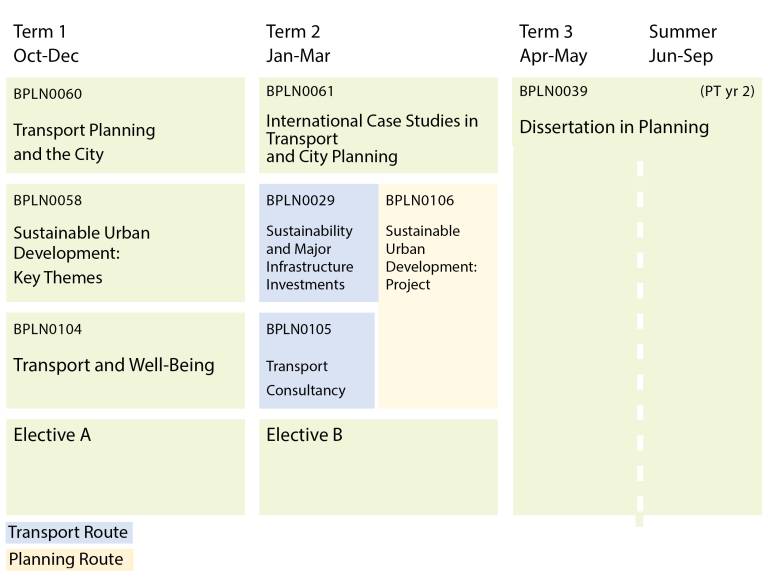
- Read more about our core modules
- Transport Planning and the City (15 credits)
- International Case Studies in Transport and City Planning (15 credits)
- Sustainable Urban Development: Key Themes (15 credits)
- Dissertation (60 credits)
And either:
1. Transport route of study: Sustainability and Major Infrastructure Investsments (15 credits) and Transport Consultancy Study (15 credits)
Or
2. Planning route of study: Sustainable Urban Development: Project (30 credits).
- Read more about our topics to help you specialise through your studies
Beyond core module studies, our students take two more modules of their choosing from across the Faculty and wider within UCL. These optional modules cover different perspectives and analytical approaches in transport planning urban planning, and include:
- Planning from The Bartlett School of Planning;
- Transport planning from The Bartlett Faculty of the Built Environment;
- Advanced spatial analysis from The Bartlett Centre for Advanced Spatial Analysis; or
- International development from The Bartlett Development Planning Unit.
Alternatively, one of two optional modules can be a 'free-ranging' optional module which allows students to choose one module from wider disciplines throughout UCL.
In addition to the range of optional modules on offer across The Bartlett Faculty of the Built Environment (subject to availability), you can use your optional modules to specialise in subject areas offered by the The Bartlett school of Planning in more depth. Our specialisms operate best in module pairs, but many of these modules can also be taken as standalone units.
Our specialism topics at The Bartlett School of Planning include:
Infrastructure Planning:
This specialism consists of two modules addressing the question 'what constitutes a successful infrastructure project, programme or plan'. The first module 'Infrastructures as Agents of Change' defines the characteristics of infrastructure projects, programmes and plans of various kinds and examines their roles as agents of change. It encompasses an understanding of past perspectives of the role of such investments and investigates 21st century perspectives in a context of global interdependencies of economic growth and environmental impacts as sustainability concerns loom large as key challenges. The second module 'Critical Issues in Infrastructures Funding, Finance and Investment' focuses on issues that cross all infrastructure sectors in the developed and developing world. It examines challenges seen to be critical to sustainable investments. While not exhaustive, the module examines the: role of PPPs, impacts of corruption, ‘Section 106 & Community Infrastructure Levy, Property value uplift and Tax Incremental Financing and impact of fiscal devolution.
Investigating Urban Transformation in Historic Cities:
This specialism provides interdisciplinary theoretical and practical tools to investigate the context and dynamics of urban transformation in historic cities. The two modules, 'Planning Discourses for Historic Cities' and 'Planning Practices in Historic Cities', analyse planning processes - both discourses and practices - used to conceptualise and regulate the rate and direction of physical change in historic urban environments. The specialism is open to students from different backgrounds and Masters programmes who are passionate about querying the complexities of urban conservation and development from different perspectives (research, policy, design and practice).
Planning for Housing:
This specialism examines the context for and process of residential development in the UK and is divided into lecture-based and project-based components. The lecture-based component, 'Planning for Housing: Process', begins by looking at the drivers of residential development including the demographics of growth. It considers who provides housing and at the evolution of the UK policy context and its current objectives. The component then looks at the residential development process from strategic and development planning, land acquisition to the occupation of homes under different tenure arrangements. The lecture programme is divided into three parts: concerned firstly with broad perspectives on housing growth, policy and planning; secondly, with housing providers, processes and delivery; and thirdly, with critical debates and outcomes today. The project-based component, 'Planning for Housing: Project, challenges students to apply and extend their knowledge of development drivers, actors and practices to real-life housing development opportunities in London. Via small group organisation, students will co-ordinate the completion of a comprehensive feasibility study and housing development brief for a specific site. Groups will be allocated strategic mandates reflecting the current policy context and objectives explored in 'Planning for Housing: Process' and will then plan, design and initiate the implementation of a development scheme from a selected development actor perspective, reflecting tenure, design, and organisational intentions. Schemes will be collectively proposed and managed and then presented by each team to an audience of peers, staff and relevant experts in the field.
Planning for Sustainability, Climate Change and Inclusion Planning for Urban Design:
This specialism looks at the inter-related themes of sustainability and inclusion. In the term one module 'Planning for Sustainability and Inclusion', a variety of conceptual issues surrounding the governing process for achieving urban sustainability are examined alongside the challenges involved in defining and achieving inclusion in the planning process. Students then have a choice in term two. If they wish to focus more on environmental sustainability and, in particular, the climate emergence, they can take 'Sustainability, Resilience and Climate Change'. If they wish to delve further into the problematics of inclusionary planning, they can take the 'Participatory Urban Planning Project'. Both of the term two modules take the form of a project, pursued through teamwork and in collaboration with external stakeholders.
Planning for Urban Design:
This specialism considers design across a range of different scales of operation, from those dealing with settlement form, to those dealing with land use mix, to those concerned with detailed design and individual site layout and comprises 'Urban Design: Density and Form' and 'Urban Design Governance'. To that extent planning is undoubtedly a design discipline and planners need to be aware of, and be concerned with, the design consequences of their decisions on the ground. To explore this role, the Urban Design Specialism is divided into two parts, reflecting the two primary means through which planners engage in urban design – first as members of collaborative design teams, who critique and advise on design proposals, and second as policy and guidance writers. Part one examines the design process through analysis, critique and the generation of alternatives for site-specific design projects. Part two addresses the process of design guidance writing and implementation.
Smart City Theory and Practice:
Run by UCL’s Centre for Advanced Spatial Analysis (CASA), these modules give you an introduction to the theory and science of cities, and technological perspectives on ‘smart cities’. Term one deals with more general perspectives on cities developed by urban researchers, systems theorists, complexity theorists, urban planners, geographers and transport engineers will be considered, such as spatial interactions and transport models, urban economic theories, scaling laws and the central place theory for systems of cities, etc. Term two then looks more specifically at the development of smart cities through a history of computing, networks and communications, of applications of smart technologies, ranging from science parks and technopoles to transport based on ICT. The course will cover a wide range of approaches, from concepts of The Universal Machine, to Wired Cities and sensing techniques, spatio-temporal real time data applications, smart energy, virtual reality and social media in the smart city, to name a few. Overall, students will develop a critical approach to more technological and quantitative understandings of the development and management of cities.
Sustainable Development Themes and Goals:
This pair of modules is concerned with sustainable development in relation to the theory of urban development and spatial planning practice in cities associated with sustainable development goals. The first module 'Sustainable Urban Development: Key Themes' focuses on sustainability debates and literature, with a specific focus on cities. The second, 'Sustainable Development Goals and Spatial Planning', explores how the Agenda 2030 and Sustainable Development Goals (SDGs) are implemented at the local or municipal level in cities.
Urban Regeneration:
This specialism is concerned with innovation, urban and regional economic development and regeneration and comprises two modules – 'Urban Regeneration: Urban Problems and Problematics' (term 1) and 'Delivering Regeneration Projects II' (term 2). The issues are analysed in the context of development economics, the new space economy, the agglomeration of innovative high-technology industries, the concepts of the innovative and creative milieu and emerging forms of urban governance. These analyses are brought to bear on project work, which allows for the examination of the relationship between those broad trends and specific local contexts and processes. The specialism comprises 2 modules: the first focuses on the theoretical framework for the understanding of the spatial and socio-economic dynamics of contemporary cities, the second is structured around a project in which students are invited to apply the theory and develop their own strategies for the regeneration of a locality.
More details of our modules can be found in the UCL module catalogue.
Please note that the course structure and list of modules given here is indicative. This information is published a long time in advance of enrolment and module content and availability are subject to change.
Field trips
Our course also includes a residential field trip during which themes relevant to the course are explored in different place contexts. This is an opportunity for our students to consider built environment issues in real world settings and network as a course community. The cost of travel and accommodation for the field trip are covered by UCL although students will need to cover meals and other personal expenses.
Flexible study
We also offer our students the opportunity to study flexibly, completing the degree between two to five years, to accomodate your work-life commitments. If taken flexibly, our students typically complete term one modules before moving onto term two modules. However, students can take taught core and optional modules in any year and any order. The dissertation module must be taken in your final year.
Careers and employability
Students who graduate from The Bartlett School of Planning have been very successful in gaining subsequent employment. There is growing demand for our graduates from a wide range of both public and private employers.
While the majority of students who graduate from the Transport and City Planning MSc are employed in planning and transport-related consultancy, and in local government and central government, our graduates also work in:
- Transport, planning, urban regeneration and environmental agencies.
- International funding institutions (including the European Investment Bank and Asian Development Bank).
- Third sector and lobby groups.
- Public and private utility companies.
- Teaching and research.
Staff
- Programme Director
Dr Robin Hickman
View Robin's profile- Teaching staff
Dr Jonas De Vos
View Jonas' profileDr Jo Williams
View Jo's profileDr Catalina Turcu
View Catalina's profileDr Stephen Marshall
View Stephen's profileDr Iqbal Hamiduddin
View Iqbal's profile
 Close
Close


